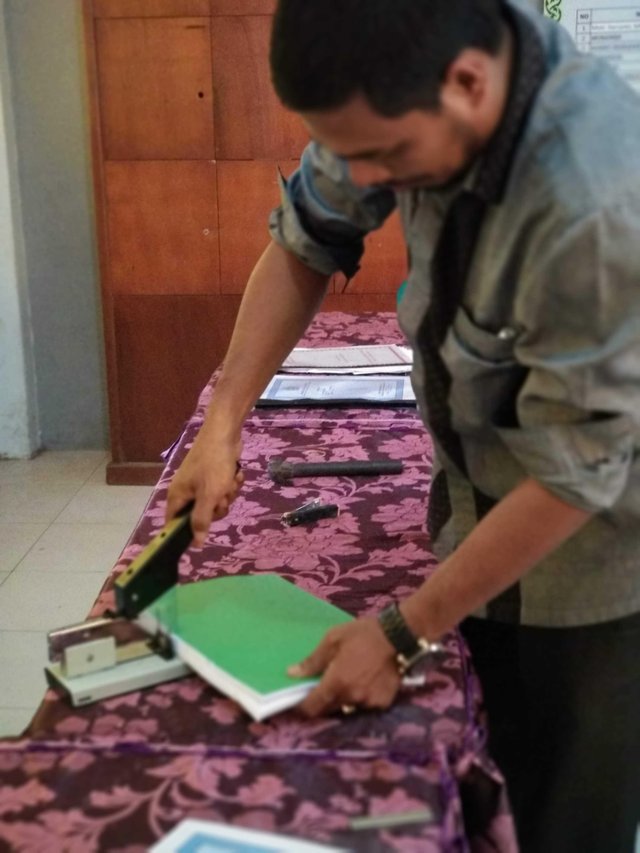
The life journey of the Asya'ari priest is very interesting for us to learn, because by knowing the journey of his life we will know the phase of change of thought that occurred to him, as far as the author explores and learns about his life, the writer concludes that the priest experiences 3 phases thoughts, namely the mu'tazilah phase, the Kullabiyah phase, and the salaf thought phase, the conclusions taken by the author are based on the evidence and the recognition of several scholars about the course of his thoughts, among these scholars are:
Imam Ibn Kathir mentions that there are 3 periods passed by al-Asy'ari and states that the final period is to write the book al-Ibanah, which was later directed by Imam Al-Baqillani.
Imam Al-Alusi said: "Indeed al-Asy'ari wrote al-Ibanah and that is his most recent work.
Imam Al-Alusi said, "Among them is Imam Abul Hasan al-Ash'ari, because his final phase is to follow the noble school of thought which is returning to the salaf in all matters of aqeedah ...
From this we know that he is a Salaf and that Asya'irah's claims are now different from the final phase of their priests who follow in the footsteps of salaf shalih. How wonderful, if they returned as he returned.
Some of the words of the cleric above show that the journey of Imam Asy'ari's thinking has 3 phases, the three phases, God willing, will be explained briefly.Muktazilah phase
Since childhood Abul Hasan has been orphaned, then his mother married a Mu'tazilah figure named Abu 'Ali Al Jubba'i, to him also the imam Asy'ari studied, and the most important was the science of kalam which was the core of the study of the mazazilah aqeedah, so he became a high priest in the Mu'tazilite.
For more or less 40 years he defended the Muktazilah aqeedah, and convinced him of true faith, but there were several questions in his mind about true aqeedah after he meditated on the verses of the Qur'an, especially related to the shifat-shifat of Allah SWT, or problems destiny, where muktazilah believes that destiny is a human creation, especially bad destiny, muktazilah thought arises because according to them all syar'i arguments must be in accordance with reason, when it collides between reason and naqal, then naqal must be adjusted to reason.
But what made him totally transformed from a man who defended muktzilah became the enemy of the most powerful muktazilah after a light discussion with his stepfather Al-jubbai, following a conversation between the two of them:

Al Asy'ary (A): What do you think about believers and unbelievers according to you?
Al Jubba'i (B): Believers get a high level in heaven because of their faith and unbelievers go into hell.
A: What about children?
B: Little children won't go to hell
A: Can a child get a high level like a believer?
B: no, because I never did good
A: If so, the child will protest God why he is not given a long life to do good
B: God will answer, if I let you live, you will do evil or disbelief so that you will not survive.
A: If so, the infidels will protest when they go to hell, why does God not turn it off as a child to survive hell.
The last question made Al-Jubbai silent.
Then the imam Asy'ari locked up at home for 15 days until he dreamed of meeting the Prophet Muhammad, after that he went to the mosque of Basrah and announced the changes in his faith.
- Phase of Itsbat 7 shifat (Kullabiyyah)
The thought of the Ash'ari priest at this phase was a thought followed by his followers today, or better known today as the Ash'ari school, in this phase actually Ash'ari imam followed the views of Imam ibn Kullab, namely to set 7 shifat to Allah SWT, he lived contemporary with Imam Ahmad, and Imam M Ahmad was very hard on Ibnu Kullab, while Imam Ibn Khuzaimah strongly denounced the Kullabiyyah School, among Ibn Kullab's views which were not spoken by the cleric before him or the Salaf cleric was that Salamullah Qadim .
Among the scholars who said that after Imam Asy'ari repented of the Mu'tazilah and then followed the Kullabiyah understanding was Al-Muqrizy in his Khuthat, he said: After Abu Hasan Ash'ari abandoned the Mu'tazilite understanding he followed the method of Abu Abdillah bin Muhammad bin sai'd bin Kullab, the same thing was also conveyed by the adzdzahabi imam, he mentioned: Some of the followers of Kullabiyah were Abu Hasan Asy'ari.
After he left the Mu'tazilah and became their main enemy, some of his thoughts were still influenced by the views of theology, which was to use a lot of reasoning and the ratio to reject the Mu'tazilite view, therefore he only set 7 shifat to Allah, different from the mu'tazilah who reject all shifat to Allah ta'ala, because according to them (mu'tazilah) shifat it is the substance itself, then when we say Allah has 7 shifat then we are more kufr than the Christians who only say 3 gods .
In this phase, theoretically, Imam Asy'ari tries to postulate with the al-quran and sunnah later with reason, but in reality he uses more reason than naqal, even prescribes the attributes of Allah SWT with reason.
It is very natural for him to think so, this is because before he was an expert in the science of kalam, so when he repented, the methods used in the science of kalam still influenced his thinking.
- Phase Reveals all Shifat (Book of Worship)
The Ushul Ibanah is a work of the Imam Abu Hasan Al-Ash'ari, which he wrote at the end of his life, the method used in this book is the method of the Salafussaleh cleric, or rather he follows the view of Imam Ahmad bin Hambal, as he stressed himself in the book, but the existence of this book is highly debated and contested from now to now, it is because the content of the content of the book is very contrary to the Ash'ari faith which developed throughout the world today, in other words when the followers of Asya'irah recognized the validity the book, and acknowledges that the Ibanah is the last book of the work of Imam Asy'ari, thus they must refer to some of their views, especially about asthma and shifat Allah ta'ala, because the imam in the book confirms that Allah is above the Throne , and God has eyes and hands, or in other words he doesn't When prescribing the verses of the Shifat Khabariah, this view is clearly very contrary to the view of Asya'irah which requires tawil shifat khabariah verses because they consider it to contain tasybih with beings.
Therefore it is undeniable that some paradigms and speculations arise about the existence of the book, some say that the book was written at the beginning of his repentance from the Mu'tazilah and then he wrote the book Allumak, there are also those who claim that the book was falsified by hand - hands that are not responsible, and there are also those who say the Asy'ari priest wrote the book under the pressure of Hanabilah followers, the core of all the questions and statements above is to emphasize that the book of the Ummah Ibanah is not the view of Asy'ari at the end of his life.
Based on the statement above the author wants to prove scientifically that the book is his greatest work at the end of his life, of course the author will prove with the statements of the insyaallah tsiqat scholars.

C. The validity of the Prophet's Book
- Imam Al-Hafizh ibnu ‘Asakir mentioned several times the Ushul Ibanah book, including:
a) The works of Abul Hasan al-Ash'ari are very famous among scholars, and disifati with the truth. Whoever reads his book entitled al-Ibanah, surely he knows his knowledge and religion. "He also said," It should be known about the nature of the situation and the truth of his aqeedah, then consider what he mentioned at the beginning of the book which he named al-Ibanah.
b) After Ibn 'Asakir mentioned the truth of his aqeedah and confirmed that it was only a foolish and stubborn person who doubted the truth of his aqeedah, then he said: "Then listen to what is said by the imam Asy'ari in the preamble of his book called Al-ibanah" , then ibn 'Asakir mentions the contents of the same book of ibanah with the circulation circulating now, which states that he did not translate the verse.
c) In the verse of his poem he mentioned: "If he only fabricates the book Ibanah and Al-lumak then that is enough".
d) Imam Abu Al-kharkudi said: I heard the Imam Abu Uthman Ash-Shabuni An-Naisabury said "that he did not come out to a council unless he brought the book of Ibanah"
Imam Baihaqi after quoting the words of Imam Syafii Rahimahulllah about the Qur'an that we read and written in the mushhaf is the Prophet Muhammad said "And the meaning of the words of Imam Shafi'i is what was mentioned by Ali bin Isma'il (Abul Hasan al-Ash'ari) in his book al-Ibanah ''.
In the book Al-'Uluw li'aliyyil Ghaffar Imam Adz-Dhahabi mentions several books written by Imam Asy'ari, and among these books is the book of the Ummah Ibanah, even Adz-Dhahabi mentions the view of Asy'ari about Istiwa 'which is the same as the view of the salaf, namely not mentakwilkan but submit kaifiyahnya (way) to Allah SWT.
Ibn Dirbas Almisri Ash-Syafii said: "The Book of Usul Ibanah 'An Ushul Diyanah is a corps of Abu Hasan Asy'ari who is the end of the case which he believes," then he also emphasized that all words are attributed to the imam Asy-' ari which is not in accordance with the Prophet's Ummah so he has referred to it.
Ahmad bin Thabit ath-Tharqi. He said, "Indeed the Jahmiyyah attributed ta'thil (denial of the nature of Allah) to Abul Hasan, but I read in his book al-Ibanah 'an Ushul Diyanah it turns out he set the attributes of Allah.'
Ibn Kathir mentioned that there were 3 periods passed by al-Asy'ari and mentioned that the final period was to write the book al-Ibanah, which was later shrived by Imam Al-Baqillani.
Ibnul Amad al-Hanbali. He said in the biography of al-Asy'ari, "Indeed al-Ash'ari said in his book al-Ibanah fi Ushul Diyanah which is his last work."
Imam Al-Alusi said: "Indeed al-Asy'ari wrote al-Ibanah and that is his most recent work. '
After the author quoted some of the words of the ulama who were muktabar about the validity of the Ushul Ibanah book, it was very clear how the opinion of Imam Asy'ari in the issue of aqidah, namely at the end of his life he wrote the book "ibanah" but surrender the literal (method) to Allah SWT, this is very clear in his affirmation in the book "Ibanah", even the same thing is stated in his other book namely Maqalat Islamiyyin and Arrisalah Ila the Tsaghr expert. In other words the views of Asya's followers 'it is very different from the Asy'ari priest himself.
Because it would be very strange when we set the God of events above the Throne and hand Kaifiyah to GOD, then some people immediately claim us as the Mujassimah or more complete Wahabi Mujassimah, which in fact indirectly he has inflicted the people who said and determined it, because scholars agree "whoever says Allah is like a creature so he can get out of Islam", this is a phenomenon that occurs in the Muslim world today, until it decides to even mislead some books that mention the problem of shifat khabariah without takwil, under the pretext that the book contains Mujahideen faith.
To ward off the wrong paradigm, the Ibanah book is the best book for us to make a reference in aqidah problem, especially the problem of shifat-shifat khabariah, so that we avoid people who quickly
mislead people without deeper clarification.

This article I took from my friend who again made a journal.
happy reading, hopefully it will benefit.
if there is no benefit in throwing away this article.